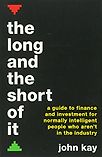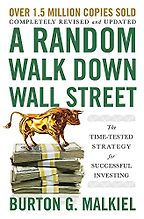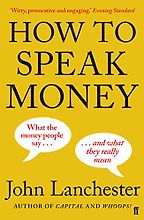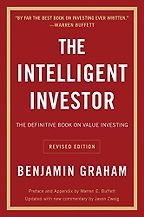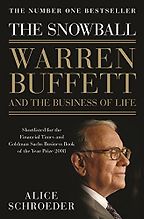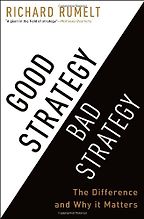We’re discussing the best investing books for beginners and I wanted to start by saying that they’re quite liberating, because reading these books (and yours) you realise you don’t have to be an absolute expert to invest. To some extent, you can piggyback off the knowledge that is in the market.
Yes, you just have to take the plunge. The way my own book came about is that my wife sold a property that was her main asset and asked me, ‘What can I read about investing?’ I recommended Burton Malkiel’s book to her, which has historically always been my answer when people ask me that question—normally intelligent people who don’t know anything about financial services.
She read it and said, firstly, ‘This is much more interesting than I thought it was going to be’ and secondly, ‘You could write a better book than that!’ That was the origin of The Long and the Short of It.
Has she done well with her investments?
She has done very well, yes. If you’re looking for a testimonial, without pressure, she’s a good one. She started back in 2007 so it was initially quite a rough period—but interesting in a way that actually worked out well, because if you were brave and pushing money into the market as it collapsed in 2008 and 2009, five years later, you’d have done quite well. Now she says to me from time to time, ‘I never imagined I’d be as rich as I am now.’
Who should be investing, in your view, given so many people don’t? Who should be reading these investing books for beginners?
Nowadays almost everyone. Defined benefit pension schemes are pretty much dying, so people have to provide for their own retirement in one way or another. Many people will be in pension schemes where they’re responsible, effectively, for their own investment strategy. Previously they did not have to acquire this kind of knowledge; they now do and should.
Pensions aside, say you’re just starting off working. Should you not be going out on a Friday night and putting the £30 you save in an investment vehicle instead? Is that the prudent way to manage your life?
Certainly if you want to be well off sometime in later life. Although that’s complicated now in Britain by the cost of housing. For an older generation of people, the first financial priority was to save up and buy a house. That’s still desirable but a lot more difficult for young people today.
Let’s focus on the stock market first. I like the quote about it from Oskar Morgenstern that came up in one of these books—that it’s like a casino where the odds are stacked in your favour.
That’s not bad, yes.
I would also add that it’s subsidised by the government, certainly in the UK and the US, maybe less so in France and other countries. You have tax-free savings accounts like ISAs and if you put your money in a SIPP (or self-invested personal pension) you really get rewarded.
That’s very important now for ordinary people. Essentially, you can accumulate a large sum tax free through ISAs and SIPPs. Just the £20,000 a year now you can put in an ISA: if you double that – if you have a partner – and multiply it by 40 – a working lifetime – you could accumulate £1.5 million. That’s even before any return you earn on it.
But what if you were in your mid-40s and had only saved up, say, £1,000. Should you still be investing or would you say, ‘Well …’
Well, what? ‘I’m going to commit suicide when I’m 70?’ In that position, as I describe in my book, you’re going to have to start by sitting down and asking what your assets and liabilities are and how you’re going to maintain your standard of living when you’re no longer earning what you’re currently earning. The answer to that will depend on the specifics of the individual.
Let’s get into the books you’ve chosen for the beginner investor. As it’s the one you’ve traditionally recommended, let’s start with Burton Malkiel’s A Random Walk Down Wall Street (1973).
Yes, that’s the book I recommend when asked by people who are highly intelligent, have a little bit of money, but feel at sea. I’m not very impressed by financial advisers—for pretty good reasons. But there is very little you can read on investment that’s not insulting to the intelligence. As you know, there are lots of ‘how to become rich by day trading’ books around, but intelligent people know what to do with those kinds of books: namely not to open them.
Do you want to say a bit what Malkiel’s book is about?
The first edition of Malkiel’s book was published in the early 1970s, soon after people started talking about the Efficient Market Hypothesis. That’s the idea that all relevant information about securities is in the price. That led people to think about index investing which really began then. You didn’t need to pay active managers who, on average, were not worth their cost: you could simply replicate the index as a whole.
“There is very little you can read on investment that’s not insulting to the intelligence”
That was about the time a rather evangelical Jack Bogle in the US set up Vanguard to market index funds to individuals. Vanguard has now become one of the largest fund managers in the world, still specialising in that kind of product.
Essentially, the theme of Malkiel’s book was that you could, in effect, do investing yourself.
I wrote down a quote from the book: “investors would be far better off buying and holding an index fund than attempting to buy and sell individual securities or actively managed funds.” Then he goes on, “a blindfolded chimpanzee can do better than an expert.”
Yes, but of course there were very few index funds around then, which is really why Bogle set up Vanguard. Now, of course, there are lots.
Do you want to explain the Efficient Market Hypothesis a bit more?
The Efficient Market Hypothesis is if you think…Gosh. What would everyone agree is a good company these days? We used to say Tesco or Sainsbury’s. Let’s take Apple.
Apple produces excellent products, it has a very enthusiastic band of consumers, it’s a very profitable company and has a very large pile of cash—but everyone knows these things and so the market value of Apple reflects the fact that everyone knows these things. That’s true generally. If it’s general knowledge, you would expect it to be reflected in the price.
What I say in my book—and I can’t say it often enough—is that the Efficient Market Hypothesis is illuminating but not true. If you haven’t grasped that idea, that publicly available information is going to be in the price, you really have no idea how to go about investing. But, equally, it’s a mistake to think that the Efficient Market Hypothesis is invariably true. If it were invariably true, Warren Buffet and George Soros and others would not be very rich men.
So reading Malkiel and understanding the Efficient Market Hypothesis is a basic building block for understanding financial markets—so key for any book for beginners that explores investing.
That’s right. If you haven’t got that idea, you haven’t got to base one.
It’s also a very readable book. He makes understanding the EMH an enjoyable process, which isn’t always the case with finance and economics books.
Yes, and without doing too much talking down to people either. There are some corny American jokes that perhaps don’t go down quite so well with a European audience, but you can forgive that.
I love the concept of a book that takes some of the findings of academic research and makes those available to the general public. A Random Walk Down Wall Street is also good because it teaches you to be on your guard against financial professionals and people touting financial expertise.
Yes. If you go and see a doctor, you’ll have a reasonable expectation that what he or she proposes to you is in your best interest. That used to be true of an accountant or a lawyer as well. It’s perhaps less true of them now, but it still has some validity. It’s much less true of a financial adviser, unfortunately.
Is that because of their incentives, would you say? Or just because they are claiming to predict a future that no one can know?
It’s partly a matter of incentives. A lot of things have been done in the UK to try and remove the distorting incentives, knocking a lot of the more overtly corrupt practices out of the industry. But it’s still pretty bad in the US. I suppose people just go where the money is.
Historically, it was true that for professions like medicine or accountancy there was a rigorous professional training. That’s never been the case with finance. There has been no rigorous professional training either of financial knowledge or about ethics.
Get the weekly Five Books newsletter
Is there a sense in which there isn’t the same corpus of professional expertise that can be taught?
People would claim there is now, as a result of modern finance theory. Indeed the CFA Institute is attempting, with some success, to replicate the knowledge and ethics of other professionals across the finance sector. Whether the corresponding body of knowledge is actually all that valuable is another matter altogether…
So in terms of the practicalities of investing in an index fund, say one based on the FTSE-100, whose level you always hear reported on the news. Would that always go up?
No, of course not.
But mainly the FTSE-100 seems to go up.
Well, over a long period of time it’s gone up. Over the last 10 years, it’s gone up.
So when would have been a bad time to invest in a FTSE-100 index fund?
1999.
Wouldn’t you have recovered by now?
You would have recovered by now, but 18 years is a long time. 1969 would have been another bad time to have bought an index fund.
Is now a bad time?
No comment.
Is an index fund a way of buying into the best companies in an economy?
If you buy an index fund for the FTSE All-Share Index, say, all you’re doing is buying all the companies that are listed on the London Stock Exchange. That will include British companies, although the largest British companies that dominate the index are, in fact, companies that largely operate overseas. You’d be buying BP and Vodafone and Glaxo and so on.
You would also be buying any company which has a London listing so you might be buying eastern European-run resource companies with somewhat doubtful commitment to high standards of corporate governance. Indeed, there is competition to attract these companies among stock exchanges.
Like Aramco?
Yes. The Saudis have been talking about floating some of Aramco over this past year. People are salivating at the prospective fees that this could produce and therefore suggesting that perhaps some of the requirements and obligations that are normally imposed on listed companies might be relaxed if the Saudis were to direct their business this way. The reckoning is that Aramco might well be the most valuable company in the world if it were listed.
But, broadly, you’re pro-index funds?
Yes and no. What I’m really against is people paying quite high fees for what is little better than an index fund. That is what is often offered to savers. You can certainly do better than that in an index fund and starting your investing activity by buying an index fund is not a bad thing to do.
“I’m not very impressed by financial advisers—for pretty good reasons”
On the other hand, as we’ve just said, you are buying a certain kind of company when you buy an index. It’s heavily weighted towards these large international companies. An index fund is not really very well diversified because economic sectors are weighted proportionately to the role of listed companies rather than by reference to the economic significance of the activity. All the big companies that dominate the indices basically sell to well-off consumers in western markets. Glaxo, BP and Vodafone are marketing to pretty much the same people around the world. In a sense, the drivers of their profits and earnings are much the same.
You can diversify more if you’re willing to choose your own stocks. Also, you don’t have to buy shares in the eastern European controlled resource companies that you might not choose if you were to invest for youself .
As I was looking at index funds I got confused by which type to buy. Is it better to buy a straight index fund or an exchange-traded fund (ETF)?
There’s not much to choose between them, for the retail investor.
So it’s more the fees you should be looking at?
You also need to be slightly careful about the nature of the fund because there are funds that simply buy the stocks that are in the index. There are other funds that attempt to replicate it by buying derivatives, so-called synthetic funds. I think the unsophisticated investor should stick with ones that actually buy the stocks, like the ones from iShares, the biggest ETF provider, or Vanguard.
Next on your list of the best investing books for beginners is John Lanchester’s How to Speak Money. Tell me about it.
John Lanchester was a novelist who set out to write a book about London life in the first decade of the 21st century and realised that finance was a big part of London life in the first decade of the 21st century. He decided he’d better learn about what was going on in finance and wrote a novel, Capital, which is very well worth reading, but not appropriate as one of your five books. He also produced a book about the crash called Whoops!
Get the weekly Five Books newsletter
He then had the idea that, having accumulated this knowledge of finance, he should write what is, in effect, a glossary of financial terms for people like him. I suppose the kind of book that he would have liked to have had when he started his project. This is it. It’s not just a dictionary. It’s a book you can read through and enjoy.
As an expert, would you say the definitions are good?
There are certainly definitions I would quibble with but the standard is high, yes.
One of the things he writes about in the introduction is how most people tune out when they hear the language of economics and investing. When you hear on the news that the FTSE is up 20 points, 99% of people don’t know what that means—or care.
And, as he discovered, and as my wife and other people have discovered, it isn’t that difficult to tune in with a modicum of effort – and help.
He makes the point that a lot of financial words actually mean the opposite of what they sound like. It seems like hedge funds should be about hedging your risk when in fact they’re doing the opposite: they’re taking enormous risks.
Yes, that’s right. That’s probably the most striking example.
Is there anything about him being a novelist that brings an extra dimension to the book?
It means he can write well, which is not true of most people writing books about finance.
So he has a definition of the bond market which I want to ask you about next. He writes, “As an investor tells Michael Lewis in The Big Short, the equity market is like a fucking zit compared to the bond market.”
I find it very strange because bonds used to be regarded as incredibly boring. Not in The Long and the Short of it, but in Other People’s Money, I wrote about the contrast between F Scott Fitzgerald’s The Great Gatsby where the completely colourless narrator is a bond salesman—because that’s about the most boring activity Fitzgerald can think of—and the Bonfire of the Vanities, the great American novel of the 1980s, where the vainglorious, flamboyant anti-hero is a bond salesman.
Bonds are also conceptually difficult for beginner investors, I think. Should one be investing in bonds right now, as well as equities?
Probably not right now, no.
But many people still regard them as a good choice because they’re supposedly a safe investment.
Right, and that’s terrible advice.
But if they’re not a safe investment, what are they?
People tend to confuse certainty with safety and security. The way I framed it in a talk the other day is that a person who knows they’re going to be hanged tomorrow has got certainty but not security. If you buy bonds now, that’s pretty much the outcome you get. If you buy bonds to provide for your retirement—which is what a lot of people are encouraged to do—you’re getting certainty that you will have a pretty low standard of living in your retirement.
What’s the point of bonds if they’re so bad?
The market for bonds has been completely distorted by the fact the government has been buying them. Historically, governments have always been the main issuer of bonds, but now around a third of total government bonds in issue are owned by the Bank of England through its Asset Purchase Facility. This is the so-called quantitative easing that has gone on for the last 10 years.
“What I say in my book—and I can’t say it often enough—is that the Efficient Market Hypothesis is illuminating but not true”
People regard the 30-year German government bund (as it’s called) as one of the ‘safest’ investments in the world. I think I say in my book that if instead of buying that, you bought an apartment in Berlin and the rent remained constant over 30 years and the flat were worthless at the end of those 30 years, you’d still do better than you would with that bond. Given that comparison, quite why anyone should want to buy the bond is hard to understand.
Basically, we’re saying that bonds are some sort of mechanism for regulating the economy. There’s sophisticated traders buying and selling them, taking a view on the macro economy, but, as a beginner investor, they’re not for you.
In present circumstances, no. The market for bonds has been dominated by these government policies and as a result bonds are just very unattractive to private investors.
And do we need to be following things closely in case this changes?
If and when interest rates go up, you’ll hear about it. It really will be the first item in the news. It’s not going to happen soon, at least on any scale…
And at that point you could start thinking about it?
When long-term bond yields get up to more traditional historic levels, you might start thinking about holding some.
Okay, yes and final point on bonds: counter-intuitively, when interest rates go up, bonds go down.
Yes. Imagine a bond that’s never going to be redeemed, to keep it simple. If it’s yielding 2% and interest rates go up to 4%, a new bond will be yielding 4% forever. Your bond is only worth half the value of the new bond. That’s why the price goes down if interest rates go up.
There are also index-linked bonds which are linked to the retail price index for both the interest and the redemption payment. In Britain, index linked bonds currently yield negative amounts, so these aren’t very interesting either.
Let’s talk about Benjamin Graham’s The Intelligent Investor (1949) next. It’s an oldie, but it’s Warren Buffet’s favourite book. He writes at the beginning of one edition about reading it when he was young: “I thought then it was the best book about investment ever written. I still think it is.”
It was the best book then. There is more competition now.
Tell us what Benjamin Graham is suggesting we do.
The idea is that you look at the underlying value of the company’s activities instead of relying on market gossip. In my book, I talk about two kinds of underlying investment strategies. One is to second-guess the market gossip and the other is to look at the underlying value of the assets you’re buying.
My suggestion is that if you’re an ordinary punter, trying to do the first—the market gossip stories—is a mug’s game.
So you should be doing what Benjamin Graham recommended back in the day.
Yes, though a lot of what Graham did was only possible in an era when you had boring, badly-run companies where the value of the underlying assets of the business were much greater than its trading value. Famously, Charles Clore bought half the shoe shops in Britain, not because he was interested in shoes but because these shops were trading out of premises that were far more valuable than the shoe businesses they were running. And no one had noticed.
“If you go and see a doctor, you’ll have a reasonable expectation that what he or she proposes to you is in your best interest”
That kind of strategy reached its culmination in the 1970s with Jim Slater. He was the most notorious of asset strippers but eventually, in the crash of ’74, Slater effectively went bust. By then most of these kinds of opportunities had been taken. I think the principal kind that remained were some badly-run businesses that had almost monopoly positions, so two or three companies—Hanson was the most famous of them—went around taking over businesses like London Brick and EverReady batteries. You bought them, cut some of the costs, put the prices up and made a profit that way. But even that kind of opportunity is now pretty rare.
Isn’t that what private equity is doing these days?
Not really. I think of private equity now as when it’s good, it’s very, very good and when it’s bad, it’s horrid. The worst kind of private equity—which is probably the dominant kind—is where you acquire a business, massage its earnings up for a couple of years, and then flip it on to somebody else. A classic illustration for me was staying in a hotel somewhere and thinking the carpet was not being replaced, the mini bar was ludicrously overpriced and breakfast cost far too much. This was obviously a hotel run by people who didn’t care if you came back and I thought, ‘This is a private equity deal.’ I checked afterwards and of course it was.
Does Graham’s book remain relevant to investors in an economy which is dominated by services?
Yes, the advice that you should look through to the underlying value, earnings and assets of the company remains valid. But the assets of Apple and Amazon are clearly very different from the assets of a shoe shop. Typically the assets of that older era were in real estate of one kind or another. Now they are in people.
If the assets of a company are people, is there any way of valuing them?
Not sensibly. People devote a lot of effort to so-called brand valuation and valuing other intangibles but, in a sense, you’re inventing a number to make the numbers add up: since the value of Apple is $800 billion—far above the value of physical assets and cash—we invent an asset to account for the difference.
What’s nice about Graham is that because it’s so old, it also gives you a bit of historical perspective. He writes about everybody getting excited about airplane stocks because air travel seemed to be the future. And yet, even though it did turn out to be the future, you’d still have lost money.
Warren Buffet has famously said that investors would have been better off if the Wright Brothers’ plane had crashed.
That leads us nicely to the next book on your list, The Snowball (2008), which seems to be an authorised biography of Warren Buffet. Why is it important for a beginner investor to read this book?
It’s on the list, firstly, because Buffet is the most successful investor in history. Secondly, he’s a successful investor based in Omaha, Nebraska, miles away from the City and Wall Street – like the beginning investor. Thirdly, his investment philosophy has been based on some very simple ideas, which are essentially a modernised version of Graham. He is asking the question, ‘How well protected are the earnings of these companies I’m buying from competition?’ Which leads him to talk about ‘moats’ and the like.
“Buffet is the most successful investor in history”
There’s a nice story in the book about Buffet as a kid noticing a kind of pinch point where all the trams went through and thinking, ‘There must be a way of making money out of this.’ That’s, in a sense, the investment philosophy: if you have a pinch point, you have a profitable business.
What would be a good example now?
In the 1980s, people started talking about ‘hollow corporations’. Apple is not quite the best example, because Apple does have retail stores. But Nike, for example, doesn’t make the shoes. They don’t sell the shoes. What Nike does is, essentially, brand the shoes, which others make and others sell. That’s where the value in the chain actually is, which is how you end up with these companies, like Apple, which don’t employ very many people, although they’re very large and very profitable businesses.
If you looked at the largest companies in Benjamin Graham’s day, they would have been General Motors and US Steel and so on, companies that employed very large numbers of people, as well as having very large sales and plants.
Many of today’s largest companies don’t. They’re characterised by these controlling, coordinating, competitive advantages like Apple and Nike.
That’s the kind of company Warren Buffet likes?
That’s the next generation of the kind of companies Warren Buffet likes.
Traditionally, which ones did he like?
Many of his first investments were local newspapers. See’s Candies was a famous early investment. As you probably know, all of this is funded by the insurance business which underpins it. There are supposed to be some reasons for being in Nebraska to do with lax Nebraskan insurance regulations.
I found it quite interesting to discover, in the book, that he was the son of a stockbroker (a bit like Mozart was the son of a musician). The genius doesn’t come out of nowhere: even though he is from Omaha, Buffet was looking at the stock market from a young age and was extremely interested in it. Also, he was a boy during the Great Depression. I suppose that gave him a strong sense of the vagaries of the economy and stock market.
That’s right. He’s not just a hick from Nebraska who turns out to be a wildly successful investor. There’s another side to that, which is the relative modesty of his lifestyle given his extraordinary wealth. The one time I’ve been in Omaha, the taxi drivers insisted on driving me past Warren Buffet’s bungalow. It’s the main tourist sight of Omaha.
So back to A Random Walk Down Wall Street. Normally when Burt Malkiel is asked to square Warren Buffet’s success with his argument that experts can’t beat the market he says that Buffet doesn’t disprove anything because Buffet is extremely activist. He gets seats on the board of companies he buys and gets involved with running the business. That is not an option that is available to you as a member of the public. Do you agree?
No. I think Buffet strikingly doesn’t get involved with the management of his companies. The head office of Berkshire Hathaway in Omaha is tiny. His philosophy has been very much about finding good managers and letting them get on with it—by which I mean good managers who are there at the time he buys the business.
Like the woman at that furniture store?
Yes, Nebraska Furniture Mart and Mrs B, Rose Blumkin, who reportedly went to the store daily till she died aged 104.
So how do I become Warren Buffet? What can I do to replicate his success?
You want to look at the underlying fundamentals of the business. You want to ask how sustainable these are against competitive threats and you want to ask what is the quality of the management of this business.
In your book you talk about the theory of ‘subjective expected utility’ in depth. Some of these tools you describe in the book are to…
Help you organise your thinking, really. It’s like the Efficient Market Hypothesis. It’s useful to know about these things, so long as you don’t take them too seriously. You should think about probabilities but it’s not going to help you to do the elaborate calculations that investment consultants would do or that there are now spreadsheets that will do for you.
Warren Buffet had very good returns over many decades, which is one thing that’s particularly extraordinary about him. Is there anything he conspicuously got wrong or had a bad experience with?
Salomon Brothers. In the late ’80s, when it was struggling, he bought into it. Later there was a scandal, many of the senior managers of the business had to be fired and he ended up having to become the chairman. That was a big mistake, as he acknowledged.
The book has a nice scene of him refusing to get involved in what turned out to be the tech bubble. Plus he has endless snippets of wisdom, like whether you would rather be the world’s worst lover and everyone think you’re the best, or the world’s best lover and everyone think you’re the worst. Obviously he’s in favour of the latter.
Carol Loomis, a journalist, helps him write the very amusing Berkshire Hathaway annual shareholder letter. There are endless aphorisms that are the sayings of Warren Buffet.
We’re now on book no. 5 on your list of best investing books for beginners, which you had a bit of trouble deciding on. Which book have you chosen to recommend?
I thought to give more variety I’d recommend Richard Rumelt. It’s not a book about investment at all. It’s a book about business strategy. The title is Good Strategy, Bad Strategy: The Difference and Why it Matters (2011). It’s very well written and I see I am quoted on the back cover saying, “This is the only book about business strategy which I didn’t want to put down.”
“What I’m really against is people paying quite high fees for what is little better than an index fund”
It goes back to what we were just saying about understanding the fundamentals of a business, as the key to successful long-term investment. Rumelt’s book is about businesses that are effectively developing their capabilities in line with the development of their markets; he contrasts those with the vast majority of businesses where what is said about strategy is basically fluff and statements of aspiration. If you want a guide to pick your way through sense and nonsense in what companies say about themselves this is the best book I know for helping you do it.
Okay, so when you’re recommending a book of strategy to the beginning investor, you’re doing so in order to…
Understand the business better. To decipher either what companies are saying about themselves or what other people are saying about these companies. There are several nice vignettes in the book where he discusses put-downs of finance people talking nonsense about business because they don’t really understand the business or anything about business in general.
Give me an example of a good strategy and a bad strategy.
The bad strategy would be the classic strategy as aspiration that goes into these kinds of mission statements. ‘Our strategy is to grow profits at 20% a year, revenues at 20% a year and so on.’ Whereas Rumelt has a very interesting contrasting vignette about talking to Steve Jobs just after he went back to Apple in the ‘Second Coming of Jobs.’
He asked Jobs, ‘What are your plans for the business?’ Jobs said, ‘I’m going to wait for the next big thing.’ The next big thing in consumer electronics turned out to be music downloads. That came in ’98, ’99 with Napster and prompted Jobs to devise the iPod to facilitate downloading and maintaining of digital music: “A thousand songs in your pocket.” The iPod was Steve Jobs’s first new product when he returned to Apple. The other next big thing was the growth of text messaging and later other social media. The genius, in the end, was to put these things together and that’s our smartphones.
This company, Apple, now has a dominant position in consumer electronics. I don’t know what is going to happen in this market, but I know what the capabilities of this company are. They’re going to look for new opportunities in the way technology for the market is developing.
Lastly, can you say a bit about your thoughts about George Soros and his book, The Alchemy of Finance (1998)? It didn’t in the end make this list of good investing books for beginners, but you were considering it.
If you think about probably the three most successful investors in the world in the last 20 years, you’d point to Buffet, Soros, and the third would be Jim Simons. Simons has built a hedge fund worth tens of billions of dollars around, essentially, high frequency trading and very sophisticated algorithms. He’s a maths professor who turned to finance. What’s interesting and ironic is that none of these people use conventional finance theory at all. Indeed all of them positively disparage it.
“I think reflexivity is actually very important—the notion that in this world future events depend on our beliefs about these future events”
Soros’s strategy has basically been to understand macroeconomic events and their relationship to markets. He’s done that better than anyone than else, really, over that period. Of course, the greatest of all his coups was the so-called breaking of the Bank of England in 1991.
Get the weekly Five Books newsletter
The reason for not putting his book on the list is that if you look at these three strategic approaches, the only one you could recommend to the ordinary investor would be the Buffet one. The Simons one obviously isn’t available to retail investors. And you’d be very brave to believe that you could achieve the combination of macro analysis and market understanding which is the basis of Soros’s investment success even if you devoted yourself to it full time.
It would break one of your cardinal rules, wouldn’t it? You would effectively be assuming you could outwit the market gossip.
Yes. He has both an understanding of the market gossip and an appreciation of the underlying macro fundamentals.
What do you think about his concept of ‘reflexivity’? I think he’d very much like it to be accepted by the academic world.
Yes, he’d really rather be an academic than a very rich man. I think reflexivity is actually very important—the notion that in this world future events depend on our beliefs about these future events. That’s why economics and finance are so fundamentally different from physics and the attempt to draw analogies and techniques from physics, have limited relevance.
April 27, 2018. Updated: March 12, 2021
Five Books aims to keep its book recommendations and interviews up to date. If you are the interviewee and would like to update your choice of books (or even just what you say about them) please email us at [email protected]
Five Books interviews are expensive to produce. If you've enjoyed this interview, please support us by donating a small amount.

